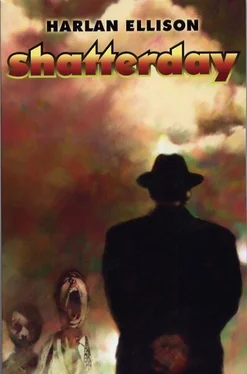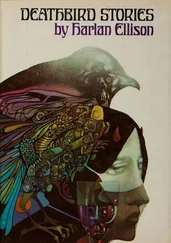But SylviaTheCunt looked.
With hard, mean eyes; straight up at the screen; locked in eternal combat with the creature for whom she had seldom felt anything but the most destructive kind of sibling rivalry.
Jimmy once told me how he had gotten SylviaTheCunt to stop pulling his hair. He said one time when she grabbed a fistful of his straight, brown hair he had gritted his teeth and started turning his body in her grasp. Around and around until the hair pulled so tight the pain went all the way to the soles of his feet. It was so horrible, so excruciating, that she had been appalled at how painful it must have been… and she let him loose. And whenever she would try it again, he would inflict that pain on himself. Until she was so horrified by it that she stopped. “That’s how I developed a very high threshold for pain,” he had said.
I remember when he got done telling me that… I was gritting my teeth.
But finally, thank God finally, Jimmy had had all of it even he could handle. He had turned and turned till the pain was insupportable, even for him. Even my best friend, Jimmy, with that seemingly limitless capacity for revenge, for not just getting even, but for getting a bit more of the vigorish in shylock interest, even he had had all he could stomach. And not a moment too soon.
“You can stop it now,” SylviaTheCunt said. And she stood up. The screen went white again, lights came on in the library where evening had descended, and Jimmy’s sister looked around at all of us.
“You haven’t heard the last of me,” she said softly, and then she left. You haven’t heard the last of me.
But I had the sure feeling that we had; we had heard the last of her. Jimmy had called in all the debts from his childhood.
We sat down again, the lights went off, the Betamax went on, and Jimmy turned his head slightly to the left, looking straight at me in my chair. He had saved me for last and he said, “Larry, buddy? You out there?”
We were driving from Chicago to New Orleans in an attempt to make Mardi Gras, which we would miss by a full day, arriving on Ash Wednesday, because in the next five miles we would spin out across the snow-covered highway, escape being piledriven by an oncoming truck by inches, plunge off the side of the road, and bury the Corvette headfirst to its rear wheels in snowbanks fifteen feet deep. But we were still five miles away from missing Mardi Gras when he said the thing I remember most clearly from all the years that we knew each other.
He was driving. He said, “You know the one thing about me that I’m terrified anyone will ever find out. The one lie that makes all of my life a lie.”
“I do?”
“Yep. You know it, but you don’t know you know it.”
“That makes no sense. If I knew it, then I’d know it.”
“You know more about me than anyone else, and you have the data; but you don’t know how much I fear it, how frightened I am that it might come out.”
“I’ll never tell.”
“You might. Get pissed off at me sometime in the future; I might screw you; you might let it slip without knowing it.”
“Never. I’ll never tell a living soul; honest to God, you can trust me, Rocco: I’ll take the filthy secret to my grave.”
“No, I’ll take it to my grave. But you might still tell it.”
“If you’re dead there’d be no way you could protect against that, is there?”
He thought about that for a while. This was before he married Leslie. We were good and close friends, whatever that meant. But he thought about it, seriously thought about this terrible thing I knew that he was ashamed of, the one thing in a life like his so filled with things any normal human being might find the cause of sleepless nights, that didn’t bother him in the slightest way. He thought about the knowledge I possessed, this Damoclean sword I held over his life and his career and his work in which he revealed everything. Everything except the one bit of knowledge that made all of his life a lie.
And he said, “I’ll have to figure out a way to keep you quiet after I’m dead.”
“Good luck,” I said, laughing lightly; and then we hit the icy patch and started to spin out.
He looked straight at me, having saved me for last.
“Larry, I herewith make you the executor of my literary estate. You have control of every novel, short story, essay, article, review, anthology and introduction I ever wrote. All those millions of words are in your care, buddy. You’re the one they’ll have to come to if they want to reprint even one of my commas.”
I sat stunned. If he had done me the way he’d done SylviaTheCunt, taken this last chance to purge all the swamp animosity of a lifetime… or if he had done me the way he’d done Leslie, tried to clear his conscience of real or fancied harm he’ d visited on her… if he’ d done me as he’ d done Missy and Bran, paid off for loyalty and friendship and domination of their lives… I wouldn’t have been surprised.
But, oh you malicious wonderful sonofabitch! You did the one thing I cannot bear: you tied me to you forever.
Malicious? Probably not. It was just Jimmy insuring his memory. Going for posterity, and dragging me along with him, kicking and screaming every micromillimeter of the way. What a mind, what a fucking sweetly conniving mind. I couldn’t even condemn him; hate him, yes, revile him, yes, rail at what he was doing, yes —against which I had no defense— but he was merely demonstrating as a perfect paradigm for his whole breakneck plunge of a life… the ugliness of simply being human.
I sat stunned. And the voice of the turtle was heard in the library: “Would you mind cutting it for a minute?”
Turtle, the voice was mine; stunned, I sat in the darkness. The sound of very old, rinkytink music played distantly in the empty concert hall of my head.
Jimmy had set me up to be either his servant or his Griswold.
Poe. Jimmy got the idea from Poe.
He saw himself as Edgar Allan, cut off in his prime from the benefits of posterity’s accolades; he saw me as the Reverend Rufus W. Griswold, but a Griswold who was walled up himself, not free to blacken Poe’s name, a Griswold never free of the sound of the tell-tale heart, Jimmy’s heart, still beating, his will indomitable, his presence felt until the last moment of my own Griswold-trapped life.
We had talked of this. Poe was one of Jimmy’s idols. He was more than an amusing storyteller to me. But Jimmy even had a puppet made of Edgar Allan, had it hanging in the living room as an ever-present reminder of what heights fantasy could reach.
And we had discussed what Griswold had done to Poe.
He had buried him for a hundred years.
What a poor judge of human nature Poe had been. What an ass. But let the critic Daniel Hoffman (Doubleday, 1972) tell it:
Most of all, [Poe’s] own Imp of the Perverse so arranged the history of his career that his literary executor was his most invidious enemy, the Reverend Rufus W. Griswold. This man, an ex-minister, a busybody of letters, an incessant anthologist and publicizer, a failed poetaster fattening on the writings of others as does a moth eating Gobelin tapestries, went to extraordinary pains, after Poe’s death, to present the deceased writer in a manner designed to make his name a household word for the dissolute, immoral, recklessly debauched. Griswold falsified the facts of Poe’s life, and he revised the texts of Poe’s letters, always with this calumnious end in view….
The scoundrel’s punishment is this: he is now known everywhere, if known at all, as the maligner of a helpless genius; whereas had he done his job honestly, he’d have won his proper modest niche among the footnotes by which the nearly forgotten are saved from total oblivion.
Читать дальше












